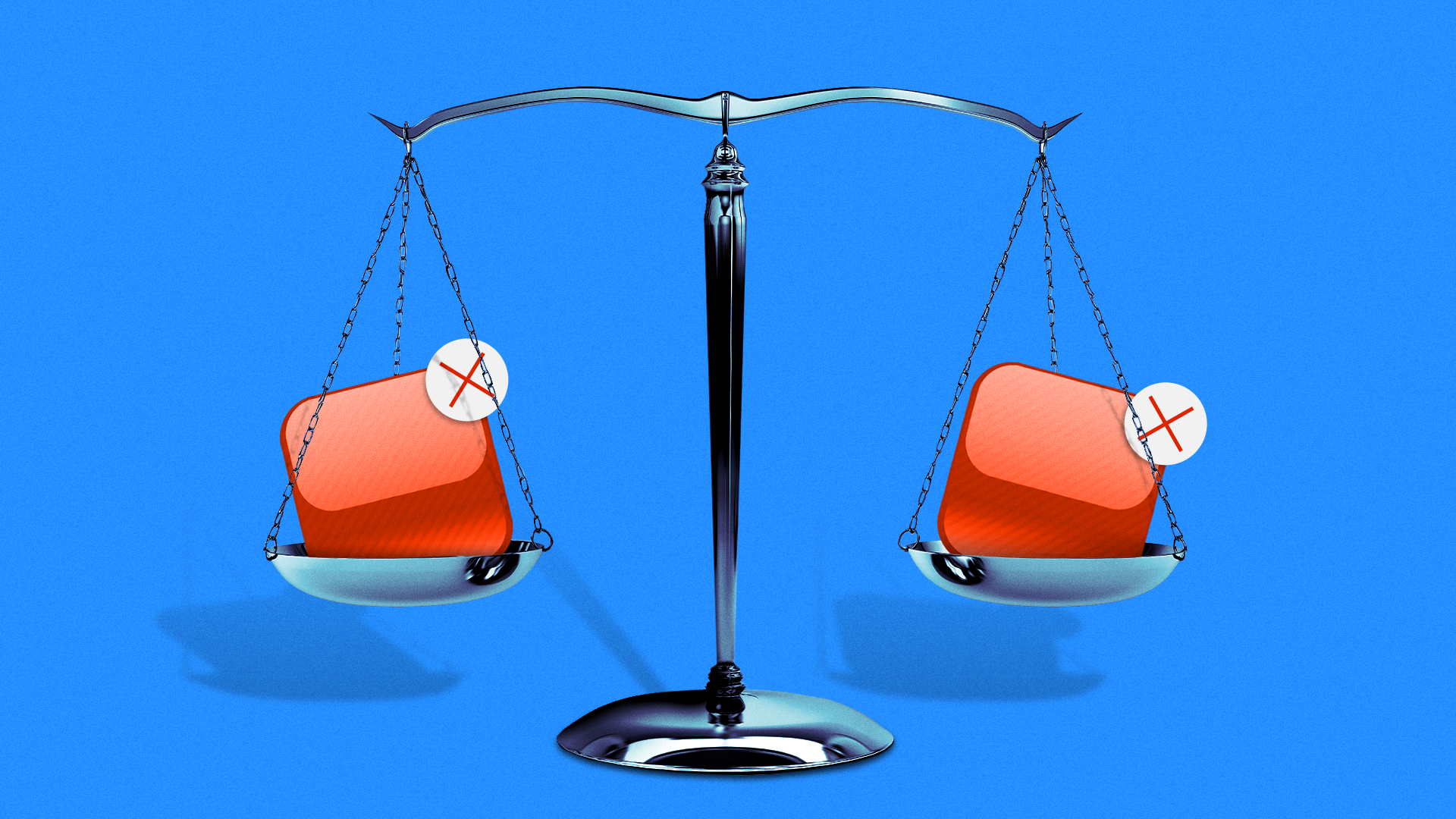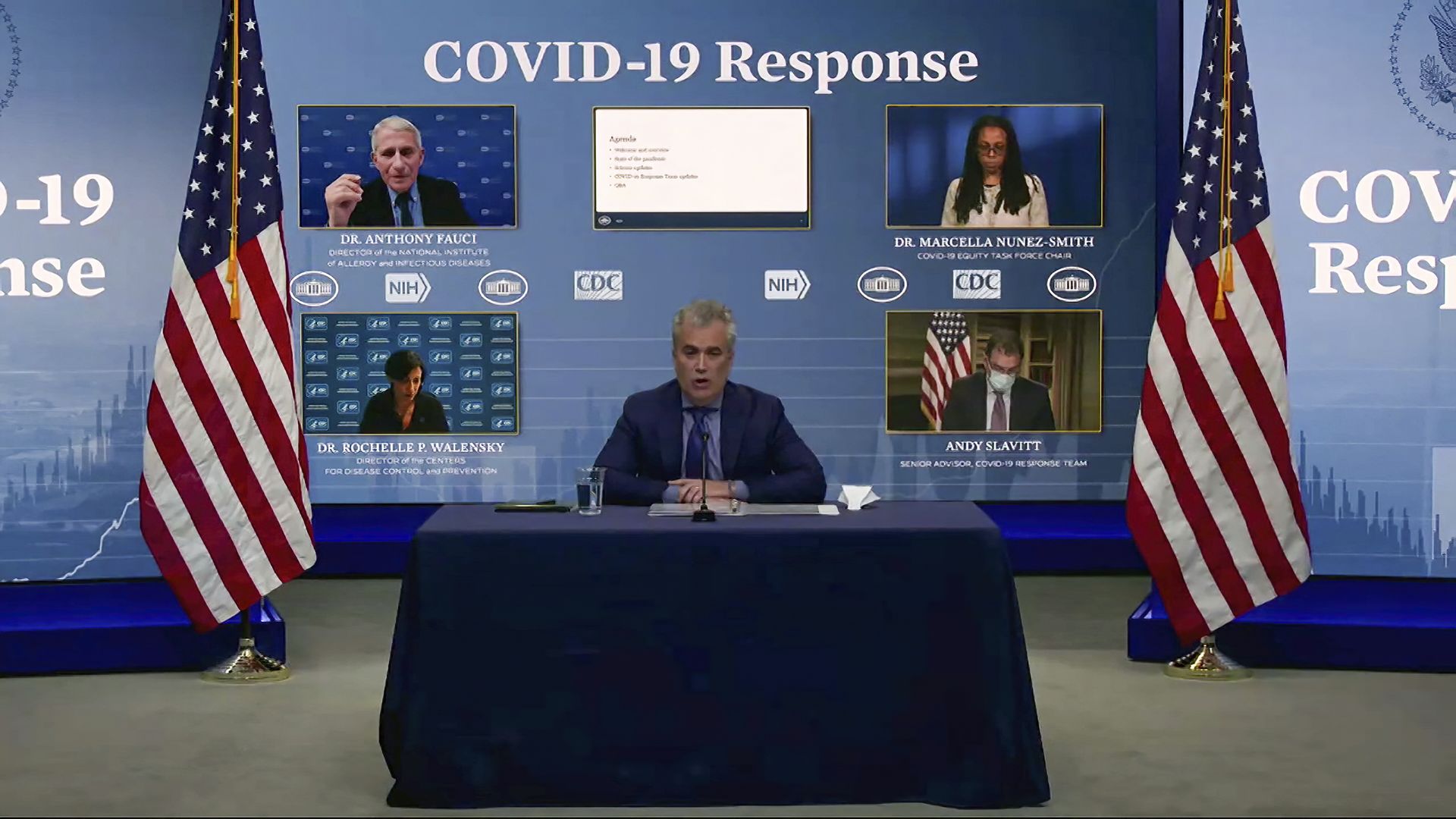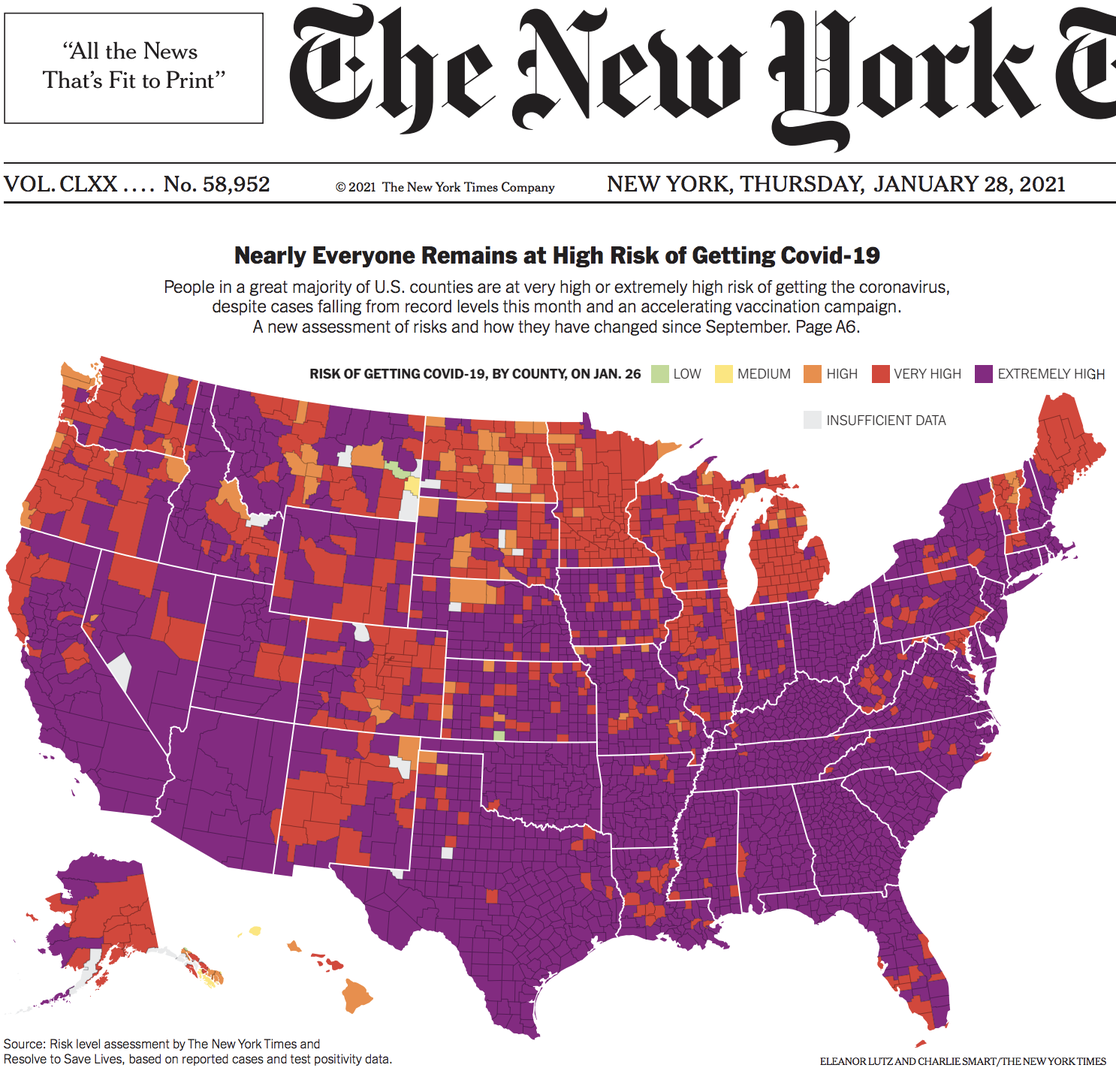| |
| |
| |
| Presented By Bank of America |
| |
| Axios AM |
| By Mike Allen ·Jan 28, 2021 |
| ☕ Happy Thursday! Today's Smart Brevity™ count: 1,163 words ... 4½ minutes. |
| |
| |
| 1 big thing: Big Tech bolts politics |
 |
|
| Illustration: Eniola Odetunde/Axios |
| |
| Big Tech fed politics. Then it bled politics. Now it wants to be dead to politics, Axios' Sara Fischer writes. - Why it matters: Social platforms that profited massively on politics and free speech suddenly want a way out — or at least a way to hide until the heat cools.
Mark Zuckerberg said yesterday on a call with investors that Facebook will dial back on pushing political groups and content to users, and take steps to reduce the amount of political content in the News Feed. - "There has been a trend across society," Zuckerberg said, "that a lot of things have become politicized and politics have had a way of creeping into everything. A lot of the feedback we see from our community is that people don't want that in their experience."
- The Chan Zuckerberg Initiative, the philanthropy run by Zuckerberg and his wife, Priscilla Chan, announced it'll spend $350 million to stand up a new group centered on criminal justice reform, which transcends partisan politics.
In the election's long lead-up and explosive aftermath, it slowly dawned on platforms that political speech may be too tough for them to adequately police without themselves getting whacked politically. - Ads: Twitter, TikTok and others have all banned political ads from the platform, while Facebook and Google have started to implement political ad limits around elections and sensitive events.
- Hyper-partisan news: Facebook and Google have tried to boost original reporting and quality news in an effort to steer eyeballs away from hyper-partisan outlets during breaking news events.
- PAC cash: Following the Capitol siege, most major tech firms said they would freeze political spending in an effort to avoid inadvertently funding members of Congress who voted not to certify the election.
Share this story. |
    |
| |
| |
| 2. "Like playing the lottery with a lot more numbers" |
 |
|
| The White House launched regular COVID briefings yesterday, led by response coordinator Jeff Zients. Photo: White House via AP |
| |
| This is scary ... The great Greg Ip writes in The Wall Street Journal (subscription) that COVID has become a shape-shifting virus: "The biggest shock to the global economy in a century is mutating — literally." - "More-transmissible and potentially deadlier variants of Covid-19 first identified in Britain, South Africa and Brazil are spreading, just as the rollout of vaccines had raised hopes for a broad-based economic recovery."
The new risk is "a possible new variant that is resistant to the immunity conferred by existing vaccines and past infections, which could ... require a new round of vaccinations," Ip writes. |
    |
| |
| |
| 3. GameStop as metaphor |
 |
|
| Illustration: Aïda Amer/Axios |
| |
| A half-forgotten and unprofitable video-game retailer is, bizarrely and incredibly, on the lips of the nation: The GameStop saga touches economic and cultural forces that affect everyone, whether or not they own a single share of stock, Felix Salmon writes. - Why it matters: In most Wall Street fights, the broader public doesn't have a rooting interest. This one — small traders win a multi-billion-dollar bet against giant hedge funds by buying stock in GameStop — is different.
The appeal of fables: The core GameStop story is a simple morality tale. A scrappy band of Wall Street outsiders, armed with little more than moxie and their stimulus checks, have not only made millions for themselves, but have also humbled big-name fund managers. - Schadenfreude: Gabe Plotkin is a hedge-fund gazillionaire who just spent $44 million buying two adjoining properties in Miami Beach. He's also famous for short-selling — for betting that companies will fail. If he and his ilk lose money, many people would feel happy.
Shamelessness: The conspiracy to bid up GameStop stock took place in broad daylight, enraging old-time traders. - Eat my shorts: There's a highly complex financial system underlying the GameStop rally, involving discount brokerages, payment for order flow, short sales, margin calls, delta hedging of call options, and much else.
- Lots of people bear longstanding grudges against some or all of that system.
The attention economy: GameStop stock has risen in direct proportion to the number of people paying attention to it. It went viral in much the same way that a white-and-gold dress does. - The internet has become reality: The GameStop story was born on Reddit, cultured on YouTube, popularized on TikTok and Twitter.
- Like any internet joke, the longer it lasts, the funnier it becomes — and the more attractive it becomes to memelords like Elon Musk.
- Share this story.
🗞️ How it's playing ... |
    |
| |
| |
| A message from Bank of America |
| New energy behind green hydrogen |
| |
 |
| |
| The heightened interest in green hydrogen is no hype. Haim Israel of BofA Global Research answers questions about how this renewable energy can bolster energy supplies while cutting harmful emissions around the world. Find out what he had to say. |
| |
| |
| 4. Two maps |
| Cases fall in 41 states ...  Data: The COVID Tracking Project, state health departments. Map: Andrew Witherspoon/Axios New COVID infections fell for the third straight week — and no state got worse, Axios' Sam Baker and Andrew Witherspoon report. - But the U.S. is still averaging roughly 165,000 new cases per day, meaning the virus is still spreading largely unchecked.
- Nationwide, new cases are now at about the same level they were at in mid-December — down from their peak, but still a lot.
Risk is high everywhere... Graphic: The New York Times At the beginning of fall, a New York Times risk assessment (based on cases and test positivity) found that residents of most counties were at "very high risk" of contracting COVID. Now, most are in the worst category — "extremely high risk." |
    |
| |
| |
| 5. Home sellers reap record profits |
 Data: ATTOM Data Solutions. Chart: Axios Visuals People who sold a median-priced home or condo last year made a typical profit of $68,843, the highest figure since at least 2005, according to real estate data provider ATTOM Data Solutions. - Why it matters: While homeownership is still elusive for Americans on bottom income rungs, it's proving to be a slot machine jackpot for the "haves," Axios Cities author Jennifer A. Kingson writes.
Keep reading. |
    |
| |
| |
| 6. Megacities on the rise |
 Data: Macrotrends. Map: Andrew Witherspoon/Axios Places with more than 10 million residents — megacities — are becoming more common as people from rural areas migrate to urban ones, Jennifer A. Kingson writes. - Why it matters: The benefits of megacities — which include opportunities for upward mobility and higher wages — can be offset by their negatives, like the fact that they're COVID breeding grounds.
Share this graphic. |
    |
| |
| |
| 7. Exclusive data: Elite tweeters spread lies |
 |
|
| Illustration: Aïda Amer/Axios |
| |
| Verified Twitter accounts last year shared more content than ever from deceptive sites, Axios' Ashley Gold writes from German Marshall Fund research. - Why it matters: Verified accounts are supposed to help social media users seek out trustworthy information and know who they're hearing from. Constantly sharing false information defeats the purpose, and reinforces false narratives.
Keep reading. |
    |
| |
| |
| 8. Online clampdown forces up price of racist novels |
 |
|
| Illustration: Sarah Grillo/Axios |
| |
| Two notorious white nationalist novels are seeing their online values surge as social media companies remove white supremacists, Axios race and justice reporter Russell Contreras writes. - "The Turner Diaries," dubbed the "bible of the racist right" by the Southern Poverty Law Center, lists on a number of sites for around $40. A few months ago, it went for less than $20.
Keep reading. |
    |
| |
| |
| 9. 📚 Coming attractions: "Front Row," the sequel |
| Jonathan Karl questions President Trump on July 21. Photo: Leah Millis/Reuters Jonathan Karl, ABC News chief Washington correspondent, will be out next year with "The Aftermath," a sequel to his New York Times bestseller, "Front Row at the Trump Show" (paperback out in March). - Dutton will publish "The Aftermath" before the 2022 midterms.
Jon tells me it'll encompass "the end — what becomes of Trump and Trumpism." - When I pointed out there are lots of Trump books coming, Jon said: "This is one of the most fascinating and consequential stories of our lifetime, so it should be a crowded field. To quote Lenin — the Russian, not the Brit: 'There are decades where nothing happens; and there are weeks where decades happen.'"
Read an excerpt of ''Front Row at the Trump Show." |
    |
| |
| |
| 10. 1 pooch thing: The hard lesson |
| Susanne Craig with Chloe. Photo: Susanne Craig. Used by permission This is N.Y. Times investigative reporter Susanne Craig with Chloe — a 60-pound, 12-year-old Labrador-basset hound mix who is her constant companion at a cabin in the Catskills. In a gripping piece, "An Unleashed Dog," Craig writes: Over the last five years, as I was holed up working on investigations about Donald Trump's finances, Chloe's job was to guard the president's tax return information. She kept me sane. I kept her safe. Until now. Keep reading. |
    |
| |
| |
| A message from Bank of America |
| A shot at a zero-carbon-emission global economy |
| |
 |
| |
| According to Haim Israel of BofA Global Research, "We're reaching an inflection point where green hydrogen could supply our energy needs, fuel our cars, heat our homes and be used in industries that have no economically viable alternative to fossil fuels." Read the insights. |
| |
| 📬 Thanks for starting your day with us. Please invite your friends to sign up for Axios AM/PM. |















No comments:
Post a Comment